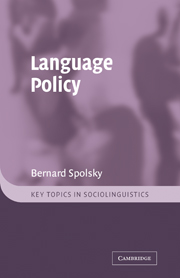Book contents
- Frontmatter
- Contents
- List of tables
- Preface
- 1 Language practices, ideology and beliefs, and management and planning
- 2 Driving out the bad
- 3 Pursuing the good and dealing with the new
- 4 The nature of language policy and its domains
- 5 Two monolingual polities – Iceland and France
- 6 How English spread
- 7 Does the US have a language policy or just civil rights?
- 8 Language rights
- 9 Monolingual polities under pressure
- 10 Monolingual polities with recognized linguistic minorities
- 11 Partitioning language space – two, three, many
- 12 Resisting language shift
- 13 Conclusions
- References
- Index
2 - Driving out the bad
Published online by Cambridge University Press: 22 December 2009
- Frontmatter
- Contents
- List of tables
- Preface
- 1 Language practices, ideology and beliefs, and management and planning
- 2 Driving out the bad
- 3 Pursuing the good and dealing with the new
- 4 The nature of language policy and its domains
- 5 Two monolingual polities – Iceland and France
- 6 How English spread
- 7 Does the US have a language policy or just civil rights?
- 8 Language rights
- 9 Monolingual polities under pressure
- 10 Monolingual polities with recognized linguistic minorities
- 11 Partitioning language space – two, three, many
- 12 Resisting language shift
- 13 Conclusions
- References
- Index
Summary
OBSCENITY, PROFANITY, BLASPHEMY AND OTHER BANNED LANGUAGE
The constraint on bad language is a common example of language policy. “Don't ever let me hear you say that word again!” the mother tells her child. “Watch your language! There are ladies present,” the barman chides a customer. “You mustn't say ‘ain't’!” the teacher nags her pupils. “That is not acceptable parliamentary language!” the Speaker admonishes the Member of Parliament. Basic to the process of correcting or trying to correct language usage is a widespread belief that parents or other caretakers have a responsibility to guarantee the successful socialization of their offspring by helping them to develop a variety of language that is useful for communication, by being intelligible, and that will lead to acceptance in desirable social settings, by not giving offense. Caretakers generally accept responsibility for helping their offspring to learn an appropriate or good variety of language.
RESPONSIBILITY FOR MANAGING BAD LANGUAGE
Generally speaking, interlocutors refrain from correcting the speech of others, but this principle may be ignored in an unequal social relationship, such as adult–child interaction (Schegloff, Jefferson and Sacks 1977: 381). This is extended to the teacher–learner situation, not just to deal with current misunderstanding but also to prevent future misunderstanding or keep the language “in good order within the speech community” (Jernudd and Thuan 1983: 80).
- Type
- Chapter
- Information
- Language Policy , pp. 16 - 25Publisher: Cambridge University PressPrint publication year: 2003



